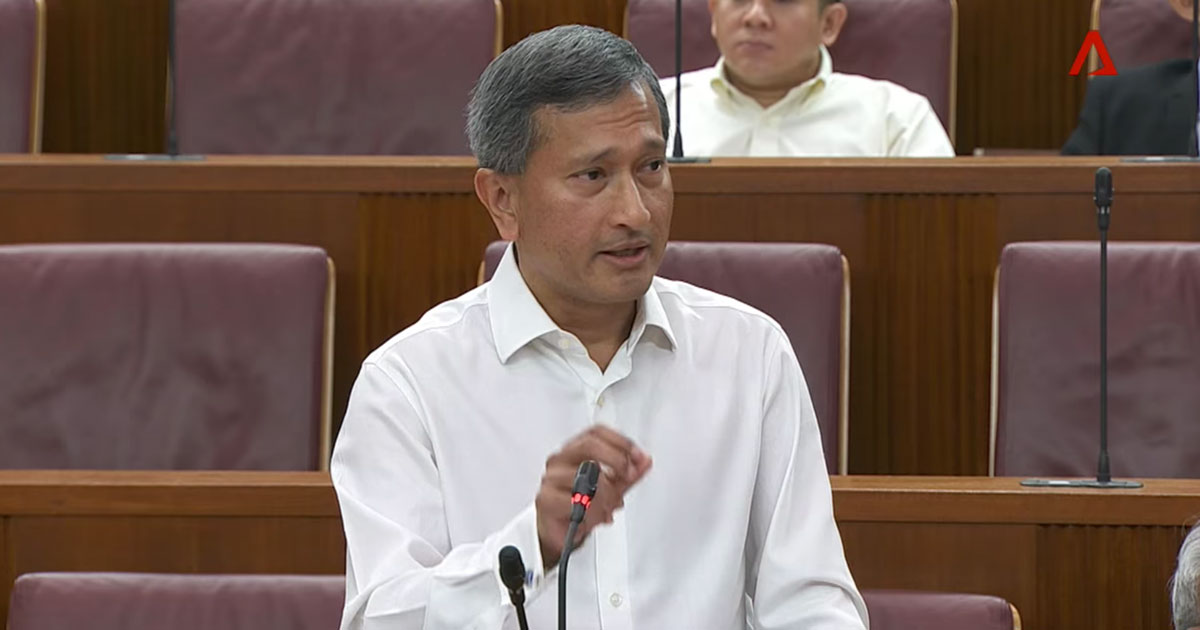Singapore's Minister for Foreign Affairs Vivian Balakrishnan spoke in Parliament on Monday, July 9, regarding Singapore's bilateral relations with Malaysia.
He referred to the 1962 Water Agreement with Malaysia, saying that neither Singapore nor Malaysia can unilaterally "change the terms of the agreement".
Previously, Malaysian Prime Minister Mahathir Mohamad brought up the issue in a couple of media interviews, saying that he wants to review the agreement as it is "too costly".
Here are the highlights of what he said:
S'pore honours the agreement, expects M'sia to do the same
"Singapore will fully honour the terms of the 1962 Water Agreement, including the price of water that was stipulated.
And we expect Malaysia to do so."
Price was never the issue
"The core issue is not how much we pay, but how any price revision is decided upon."
He deemed this so important he had to say it twice.
[related_story]
Water agreement related to S'pore's sovereignty
He said that the 1962 Water Agreement is not an ordinary one for it ties back to Singapore's sovereignty:
"The 1962 Water Agreement was guaranteed by both Malaysia and Singapore.
This guarantee was in the 1965 Separation Agreement, which in turn was registered with the United Nations.
Any breach of the 1962 Water Agreement would call into question the Separation Agreement, which is the basis for Singapore's very existence as an independent sovereign state."
M'sia lost the right to review water prices and acknowledged so
"Malaysia lost its right to review the price of water under the 1962 agreement in 1987.
We have made this point publicly on multiple occasions.
In fact, Malaysia has previously acknowledged that they themselves chose not to ask for a review in 1987 because they benefited from the pricing arrangement under the 1962 Water Agreement."
M'sia made a conscious decision not to review water prices back in 1987 as it benefits from the deal
"Johor currently buys treated water from Singapore at 50 sen per thousand gallons.
This price, and in fact event the volume, is provided for under the 1962 Water Agreement.
50 sen per thousand ringgit is a fraction of the true cost of treating the water.
Hence, in 2002, then Prime Minister Mahathir in his first incarnation, said that Malaysia did not ask for a review when it was due as Malaysia knew that any revision would also affect the price of treated water sold by Singapore to Malaysia.
Then Johor State Assembly Speaker Zainal Abidin Mohd Zain also said: "There was no point in pressing for a review of water price in 1986 as Johor was dependent on Singapore for its treated water supply."
And Singapore would also increase the price of treated water sold to Johor.
Malaysia took a conscious decision not to review the price when it had the opportunity to do so.
This is why even to this day, Johor buys more treated water than it is entitled to strictly under the 1962 Water Agreement.
These additional supplies of treated water that we've been selling to Johor at Johor's request, and sold at the same rate stipulated by the 1962 Water Agreement.
This sale is made on a good will basis, and without prejudice to our rights under the 1962 Water Agreement."
S'pore might not have invested and paid to develop Johor's water catchment areas if water price was reviewed in 1987
"If in 1987, Malaysia had exercised its rights to review the price of water, Singapore would have made quite different investment decisions in developing the Johor river and its water catchment areas.
One example is the Linggiu reservoir.
In 1990, the PUB and Johor signed an agreement to construct the Linggiu dam to increase the yield of the Johor river in order to enable reliable extraction of PUB's full entitlement of 250 million gallons (of water) per day.
Johor owns the Linggiu dam.
But Singapore paid for its construction and continues to pay for its operations.
These sums incurred are on top of the RM 320 million that we paid to Johor in 1990 as compensation for the land that is used by the Linggiu reservoir project, and for the potential loss of revenue from the logging activities, and as a one-time payment for the lease of that land for the remaining tenure of the 1962 Water Agreement."
S'pore-M'sia relations still good but some things to work on
Lastly, he said:
"Singapore and Malaysia will always be closely intertwined and interdependent.
We are committed to engaging with the new Malaysian government.
But we must work with each other on the basis that both sides will fully respect the sanctity of international agreements and that any disputes will be resolved peacefully in accordance to international law, provided this condition is met."
Nevertheless, he said he is confident bilateral relations between Singapore and Malaysia will prosper for the "mutual benefit of the citizens of both countries".
You can watch his full speech here:
Top image via CNA/FBSome related articles you might be interested in:
Some somewhat-related articles you might be interested in:
If you like what you read, follow us on Facebook, Instagram, Twitter and Telegram to get the latest updates.
